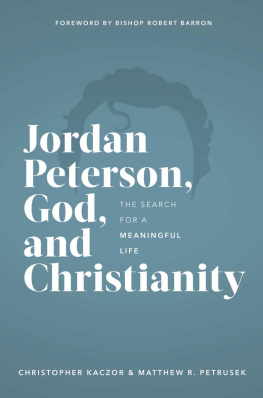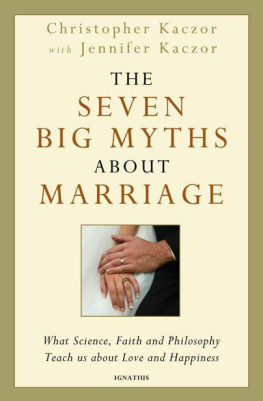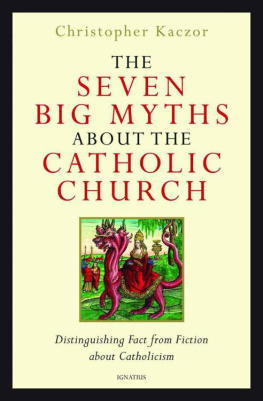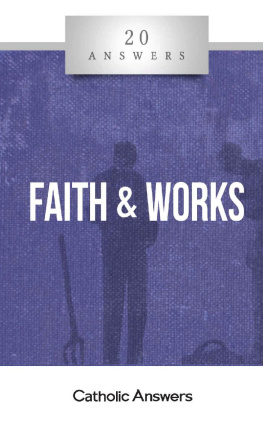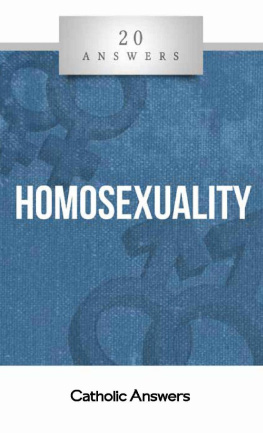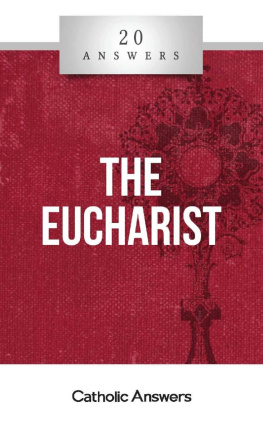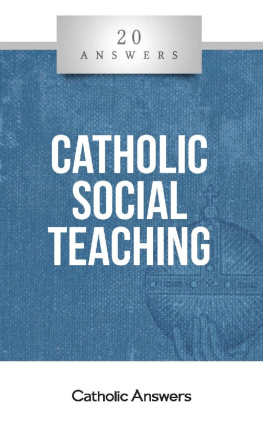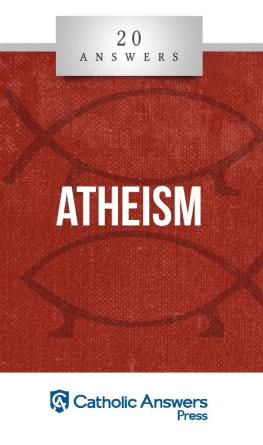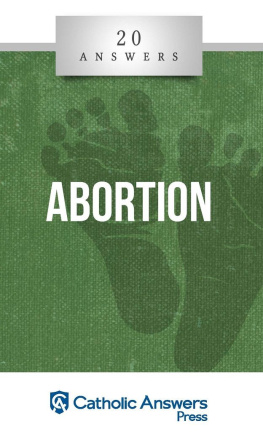Christopher Kaczor - 20 Answers: Faith & Reason (20 Answers Series from Catholic Answers Book 36)
Here you can read online Christopher Kaczor - 20 Answers: Faith & Reason (20 Answers Series from Catholic Answers Book 36) full text of the book (entire story) in english for free. Download pdf and epub, get meaning, cover and reviews about this ebook. year: 2020, publisher: Catholic Answers Press, genre: Religion. Description of the work, (preface) as well as reviews are available. Best literature library LitArk.com created for fans of good reading and offers a wide selection of genres:
Romance novel
Science fiction
Adventure
Detective
Science
History
Home and family
Prose
Art
Politics
Computer
Non-fiction
Religion
Business
Children
Humor
Choose a favorite category and find really read worthwhile books. Enjoy immersion in the world of imagination, feel the emotions of the characters or learn something new for yourself, make an fascinating discovery.

- Book:20 Answers: Faith & Reason (20 Answers Series from Catholic Answers Book 36)
- Author:
- Publisher:Catholic Answers Press
- Genre:
- Year:2020
- Rating:3 / 5
- Favourites:Add to favourites
- Your mark:
- 60
- 1
- 2
- 3
- 4
- 5
20 Answers: Faith & Reason (20 Answers Series from Catholic Answers Book 36): summary, description and annotation
We offer to read an annotation, description, summary or preface (depends on what the author of the book "20 Answers: Faith & Reason (20 Answers Series from Catholic Answers Book 36)" wrote himself). If you haven't found the necessary information about the book — write in the comments, we will try to find it.
20 Answers: Faith & Reason (20 Answers Series from Catholic Answers Book 36) — read online for free the complete book (whole text) full work
Below is the text of the book, divided by pages. System saving the place of the last page read, allows you to conveniently read the book "20 Answers: Faith & Reason (20 Answers Series from Catholic Answers Book 36)" online for free, without having to search again every time where you left off. Put a bookmark, and you can go to the page where you finished reading at any time.
Font size:
Interval:
Bookmark:

20 Answers
g
Faith & Reason
Christopher Kaczor

20 Answers: Faith & Reason
Christopher Kaczor
2019 Catholic Answers
All rights reserved. Except for quotations, no part of this book may be reproduced or transmitted in any form or by any means, electronic or mechanical, including photocopying, recording, uploading to the internet, or by any information storage and retrieval system, without written permission from the publisher.
Published by Catholic Answers, Inc.
2020 Gillespie Way
El Cajon, California 92020
1-888-291-8000 orders
619-387-0042 fax
Printed in the United States of America
978-1-68357-151-3
978-1-68357-152-0 Kindle
978-1-68357-153-7 ePub
Introduction
There is a modern myth that faith and reason are locked in a centuries-old and intractable battle. We must choose: either faith or reason. Either we embrace spirituality, revelation, and a life of loving God and neighbor, or we embrace reason, science, and a life based on reality.
This way of thinking about faith and reason is embraced by two groups of people that otherwise disagree about almost everything. The first group includes many Protestant Fundamentalists who embrace faith and reject reason. They are suspicious of science and hostile to philosophy, and think that faith alone and the Bible alone settles every significant issue. The second group is made up of the New Atheist types who claim that embracing reason, science, and logic means we must reject the existence of God, the trustworthiness of Jesus, and the work of God in the Church.
These two groupsquite loud in our society though not great in numberdebate as if it were obvious and indisputable that faith and reason are old enemies. We must choose, they think, between the two, and never can faith and reason be reconciled.
But this is not the Catholic approach, as we will see in this short book.
1.What is reason?
When we speak about reason , we mean uses of the human mind to seek and to understand the truth. We can use our reason in academic disciplines such as psychology, mathematics, and history. Reason is also exercised in producing various technologies and in living life wisely.
Two uses of human reason are especially important when considering the relationship between faith and reason. One is found in science, in which people use the method of empirical verification to determine whether or not some hypothesis is true. Another is found in philosophy, in which people seek wisdom by defining terms, assessing the truth of propositions, and making arguments to establish conclusions.
Some people think that the Church opposes reason, at least as used in science and philosophy. But when we look at what the Church teaches about both science and philosophy, we discover that just the opposite is true. The Church does not oppose science, but for centuries has supported it. Every Catholic university in the world has departments of science. The Pontifical Academy of Science supports scientific research and gatherings of scientists each year within the walls of the Vatican. The Church proclaimed St. Albert the Greata medieval pioneer of natural sciencethe patron saint of scientists.
And Catholics have contributed some of the most significant scientific discoveries of all time. For example, a Catholic priest named Georges Lematre is known as the father of the Big Bang theory because, using equations from Albert Einstein, he convinced the scientific world that the entire universe (all space, all time, and all matter) arose from a single point. Catholic Alexander Flemming invented penicillin. Gregor Mendel, an Augustinian priest, founded modern genetics. Another Catholic, Louis Pasteur, founded microbiology and created the first vaccine for rabies and anthrax. Nicolas Copernicus, another Catholic cleric, first proposed that the earth revolved around the sun. The list is long of Catholics, indeed many priests and especially Jesuits, who contributed to the development of science.
And what about philosophy? When some people think of philosophy, they think of a college course, the content of which may be pretty remote from the concerns of everyday life. But philosophy is for everyone, and one of the great gifts Pope St. John Paul II left the Church was a reminder of that. We may not be aware of it, but as reasoning human beings we engage in philosophy every day. For example, each of us has some standard by which we judge whether a statement is true or falsethis is epistemology . Each of us has some standard by which we judge whether an action is right or wrongthis is moral philosophy . Each of us has some view about what really exists in realitythis is philosophy of nature and metaphysics .
Every human being is, in some sense, a philosopher. In his great encyclical on faith and reason, Pope St. John Paul II noted that everyone explicitly or implicitly asks, Who am I? Where did I come from and where am I going? Why is there evil? What is there after this life?... They are questions that have their common source in the quest for meaning that has always compelled the human heart. In fact, the answer given to these questions decides the direction that people seek to give to their lives ( Fides et Ratio 1). Does the Church oppose reason as it is used in philosophy? On the contrary, John Paul II, who was himself a professor of philosophy, continued, The Church cannot but set great value upon reasons drive to attain goals that render peoples lives ever more worthy. It sees in philosophy the way to come to know fundamental truths about human life. At the same time, the Church considers philosophy an indispensable help for a deeper understanding of faith and for communicating the truth of the gospel to those who do not yet know it ( Fides et Ratio 5).
For this reason, the Church has produced some of the most important philosophers of all time, including St. Augustine, St. Thomas Aquinas, and Descartes. In our own time, Catholic professors teach at some of the most prestigious universities in the world. Catholic universities require all their students to study philosophy. The Church does not oppose the use of reason in science or in philosophy or in any other realm, but rather encourages and celebrates it.
2.Is it reasonable to believe in God?
Philosophers from ancient days and through the agesincluding Plato, Aristotle, Augustine, Aquinas, Descartes, and many others, down to our own timehave given numerous arguments for why it is reasonable to believe in God. Clearly many reasonable people believe in God, and they have provided reasons for doing so. As the Catechism of the Catholic Church (CCC) notes, Mans faculties make him capable of coming to a knowledge of the existence of a personal God. But for man to be able to enter into real intimacy with him, God willed both to reveal himself to man, and to give him the grace of being able to welcome this revelation in faith. The proofs of Gods existence, however, can predispose one to faith and help one to see that faith is not opposed to reason (35). On what grounds do people conclude that God exists? What are their reasons?
Numerous types of arguments have been offered. But to raise one example: many people, including professional philosophers, have found the Kalam Cosmological Argument persuasive. It goes like this:
Major Premise: Whatever begins to exist has a cause.
Minor Premise: The universe began to exist.
Conclusion: Therefore, the universe has a cause.
Lets look at each premise. Inductive reasoning from scientific evidence confirms the major premise. Human beings begin to exist, and they have a cause: parents. Trees begin to exist, and they have a cause: seeds. Science knows of no case in which something just pops into existence without any prior cause.
Font size:
Interval:
Bookmark:
Similar books «20 Answers: Faith & Reason (20 Answers Series from Catholic Answers Book 36)»
Look at similar books to 20 Answers: Faith & Reason (20 Answers Series from Catholic Answers Book 36). We have selected literature similar in name and meaning in the hope of providing readers with more options to find new, interesting, not yet read works.
Discussion, reviews of the book 20 Answers: Faith & Reason (20 Answers Series from Catholic Answers Book 36) and just readers' own opinions. Leave your comments, write what you think about the work, its meaning or the main characters. Specify what exactly you liked and what you didn't like, and why you think so.

